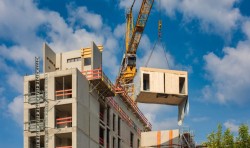Will cost be the death of Modern Methods of Construction (MMC)? Here, Scott Tacchi, Head of MMC, Sir Robert McAlpine, looks to give the answer.
30 years on from the Latham report, construction is still in a race to the bottom on pricing. Commercial managers pursue MMC not for its value delivering quality and improving productivity but as a low-cost alternative to traditional methods.
A fundamental mindset shift is needed, and not in the least because, as of yet, MMC is not a low-cost alternative to traditional methods of construction. However, MMC does offer a solution to some of the industry's biggest woes – productivity, quality, sustainability and health and safety amongst them. We cannot afford a construction sector that is not working to improve these metrics, but the opportunity to use MMC as the means to get there is at risk from the sector's singular focus on cost.
There are two forms of modular, or volumetric, construction – volumetric housing and volumetric components. Volumetric housing offers turnkey residential solutions. Volumetric components are comprised of sets, such as pre-fabricated MEP systems, unitised cladding systems, pre-cast frame and floors, pre-manufactured wall assemblies, or pod bathrooms.
A common misconception is that volumetric components provide a cheaper construction solution – and if not, a project should not waste time with them. Yet until production enters high volumes not currently seen in the UK market, package price or unit price for volumetric components will remain at these higher levels.
This is because 'Buying Gain', as it's known in some procurement circles, relies on the mass production of near identical products. In the UK market, very few of our schools, hospitals, prisons, or commercial buildings are identical. With these small differences in design, we lose the ability to maximise buying gain. The Private Sector Construction Playbook recently highlighted this and endorsed design for manufacture and assembly (DfMA) to drive standardisation.
This is not to say the industry should wait for MMC's costs to change. Package price is one dimension in a three-dimensional world, and volumetric components can still represent better value for money in the whole. Solely assessing cost will not quantify benefits to quality, speed and health and safety. Nor can cost quantify the social value benefits of firm staff no longer required to travel across the country, living in hotels, or the carbon savings from reducing millions of miles of unnecessary vehicle movements.
MMC's value for clients and the industry isn't defined by a pound sign. MMC is an investment, with improved productivity, increased margins and better-quality builds at stake. McKinsey research put the average growth of construction sector productivity at 1% over 20 years, a figure which pales in comparison to the 2.8% growth across the global economy. As an industry, we are committed to reversing this, so why not use all available tools at our disposal?
Until commercial managers are able to look beyond a spreadsheet's bottom line and assess MMC's additional, and currently uncalculated, benefits (and communicate these to clients) we will continue to battle misunderstanding of MMC. It is outdated to see a product as more attractive, better, just because it is cheaper on paper. It's past time our industry sees MMC for the full remit of its value delivery – only with this shift can both MMC and our sector evolve.









